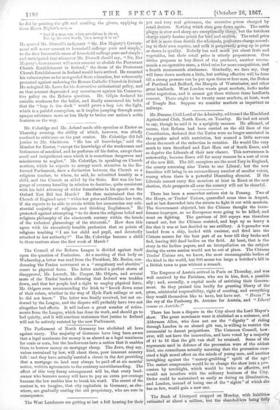Mr. Coleridge and Mr. Acland made able speeches at Exeter
on Thursday evening, the ability of which, however, was chiefly confined to criticisms on the past session. Mr. Coleridge did full justice to Mr. Gladstone. "He has all knowledge," said the Member for Exeter, "except the knowledge of the weaknesses and littlenesses of mankind, and he performs all his duties, except those small and insignificant ones which it is sometimes dangerous and mischievous to neglect." Mr. Coleridge, in speaking on Church matters, which he expects to occupy much attention in the Re- formed Parliament, drew a distinction between the Church as a religious teacher, to whom, he said, he submitted humbly as a child, and the Church as aided by the State. But was his lan- guage of extreme humility in relation to doctrine, quite consistent with his bold advocacy of wider formularies in his speech on the Oxford Test Bill last March ? He then maintained that the Church of England must "widen her gates and liberalize her tests, if she expects to be able to retain within her communion any sub- stantial majority of religious and thinking Englishmen." He protested against attempting "to tie down the religious belief and religious philosophy of the nineteenth century within the bonds of the technical phraseology of the sixteenth." How does this agree with his excessively humble profession that on points of religions teaching "I am her child and pupil, and devotedly attached to her authority?" Has Mr. Coleridge become a child in these matters since the first week of March ?


































 Previous page
Previous page